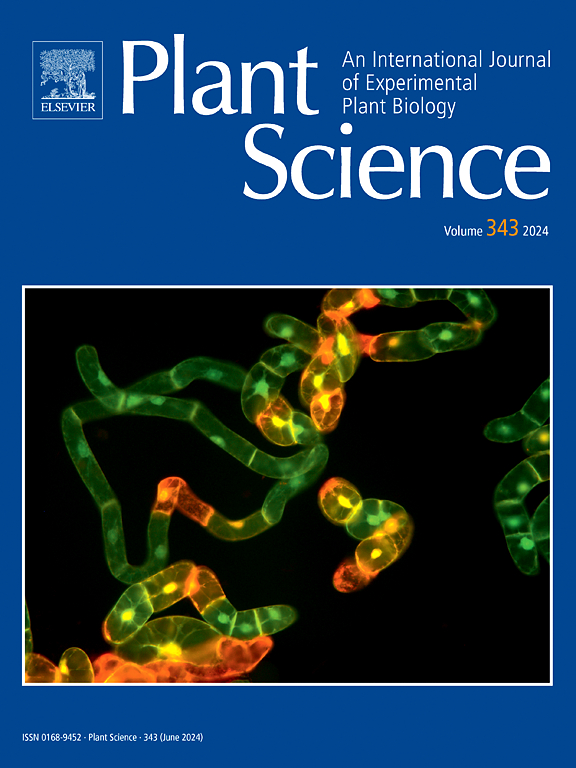Aquaporin GhPIP2;1 positively regulates salt tolerance in upland cotton (Gossypium hirsutum L.)
IF 4.2
2区 生物学
Q2 BIOCHEMISTRY & MOLECULAR BIOLOGY
引用次数: 0
Abstract
Aquaporins (AQPs) facilitate transmembrane water transport and play a crucial role in plant adaptation to diverse abiotic stress conditions. Plasma membrane Intrinsic Proteins (PIPs) are a crucial subgroup of aquaporins that facilitate water transport across plant cell membrane. However, the role of PIPs under salt stress responses in cotton remains partially unexplored. In this study, we found that the expression level of the aquaporin gene GhPIP2;1 was significantly upregulated under salt stress at three-leaf stage in upland cotton. The overexpression of GhPIP2;1 in Arabidopsis thaliana and virus-induced gene silencing (VIGS) in upland cotton evidenced that GhPIP2;1 positively regulate salt tolerance function. Biochemical analysis including superoxide dismutase (SOD), peroxidase (POD) activities and malondialdehyde (MDA) content measurements indicated that GhPIP2;1 could enhance stress tolerance by regulating the reactive oxygen species (ROS). The Electrophoretic mobility shift assay (EMSA) and dual luciferase reporter assay confirmed that GhNAC072 specifically binds to the promoter region of GhPIP2;1 and enhance the expression of GhPIP2;1. Phenotypic observations and physiological measurements of GhNAC072 overexpressed Arabidopsis and silenced cotton plants demonstrated that GhNAC072 positively responds to salt stress. The expression level of GhPIP2;1 was significantly decreased in GhNAC072-silenced plants, indicating that GhNAC072 enhances salt tolerance by regulating GhPIP2;1 expression. In summary, this study systematically confirmed that GhPIP2;1 may involve in salt tolerance mechanism in cotton and its expression is regulated by GhNAC072. These results will provide gene resources for salt tolerance and enrich the knowledge on the mechanism of salt tolerance in cotton.
水通道蛋白GhPIP2;1正调控陆地棉的耐盐性。
水通道蛋白(AQPs)促进水跨膜运输,在植物适应多种非生物胁迫条件中起着至关重要的作用。质膜固有蛋白(PIPs)是水通道蛋白的一个重要亚群,促进水在植物细胞膜上的运输。然而,pip在棉花盐胁迫响应中的作用仍部分未被探索。在本研究中,我们发现盐胁迫下旱棉三叶期水通道蛋白基因GhPIP2;1的表达水平显著上调。GhPIP2;1在拟南芥中的过表达和在陆地棉花中的病毒诱导基因沉默(VIGS)证明了GhPIP2;1正调控耐盐功能。生化分析包括超氧化物歧化酶(SOD)、过氧化物酶(POD)活性和丙二醛(MDA)含量测定表明,GhPIP2;1可以通过调节活性氧(ROS)来增强胁迫耐受性。电泳迁移率转移试验(EMSA)和双荧光素酶报告基因试验证实GhNAC072特异性结合GhPIP2;1的启动子区域,增强GhPIP2;1的表达。GhNAC072过表达拟南芥和沉默棉花植株的表型观察和生理测量表明,GhNAC072对盐胁迫有积极的响应。GhNAC072沉默植株中GhPIP2;1的表达水平显著降低,说明GhNAC072通过调节GhPIP2;1的表达增强了耐盐性。综上所述,本研究系统地证实了GhPIP2;1可能参与棉花耐盐机制,其表达受GhNAC072调控。这些结果将提供棉花耐盐基因资源,丰富对棉花耐盐机理的认识。
本文章由计算机程序翻译,如有差异,请以英文原文为准。
求助全文
约1分钟内获得全文
求助全文
来源期刊

Plant Science
生物-生化与分子生物学
CiteScore
9.10
自引率
1.90%
发文量
322
审稿时长
33 days
期刊介绍:
Plant Science will publish in the minimum of time, research manuscripts as well as commissioned reviews and commentaries recommended by its referees in all areas of experimental plant biology with emphasis in the broad areas of genomics, proteomics, biochemistry (including enzymology), physiology, cell biology, development, genetics, functional plant breeding, systems biology and the interaction of plants with the environment.
Manuscripts for full consideration should be written concisely and essentially as a final report. The main criterion for publication is that the manuscript must contain original and significant insights that lead to a better understanding of fundamental plant biology. Papers centering on plant cell culture should be of interest to a wide audience and methods employed result in a substantial improvement over existing established techniques and approaches. Methods papers are welcome only when the technique(s) described is novel or provides a major advancement of established protocols.
 求助内容:
求助内容: 应助结果提醒方式:
应助结果提醒方式:


